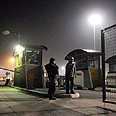
Karni crossing
Photo: Tzafrir Abayov
Just hours after Prime Minister Benjamin Netanyahu announced the list of goods and products that will be allowed into the Gaza Strip, international attention continues to focus on the items left out.
The list of prohibited items, according to estimates, will be presented in its final format within a few days and will be based on recommendations to be submitted by Netanyahu, Defense Minister Ehud Barak, and Foreign Minister Avigdor Lieberman.
Arab Lawmaker
Arab lawmaker who took part in Gaza-bound flotilla says it marked 'beginning of total collapse of Israeli siege.' Adds: I won't be deterred by political persecution, scare campaign
The list of forbidden items, it seems, will also be based on the Wassenaar Arrangement, an international export regime that monitors the export of dual-use technology that can be used for both civilian and military purposes.
The list will be based on a recognized international accord in the hopes of garnering broad legitimacy throughout the world for the terms of the Gaza blockade. The Wassenaar Arrangement was signed by 40 countries.
In addition to items listed under the international export regime, the list of items prohibited from entering the Gaza Strip will include items forbidden entry to the West Bank in the defense minister's directive issued in 2007 and updated a year later.
Ultimately, thousands of items will be kept out of Gaza, and will be listed on a detailed list in order to avoid situations of uncertainty or controversy. Defense officials estimated that foodstuffs and humanitarian equipment will not be prohibited entry, but that the list may include products items such as aluminum, and various metals and fertilizers, out of fears that Hamas will use these items to construct weapons.
"The list being put together will allow, on the one hand, for many products from a range of types to enter the Gaza Strip. However, via oversight mechanisms, the list will make it possible to stop a product that can be used for opposite uses," said a defense official to Ynet.
"Even today there is no shortage in the Gaza Strip, not in food or in medicine. For Israel, there was never any intention to harm the civilian population, which Hamas unfortunately is doing. We are hopeful that everything entering the Gaza Strip will reach its destination, which is the Palestinian population, and will not become a tool in the hands of Hamas as has happened in the past."
Despite this, officials in the coastal enclave were quick to say that all declarations issued from Israel today are nothing more than a cover-up meant to ease pressures placed on Israel, and they are not meant to result in a real change to the hardship in the Strip.
According to them, there is a real shortage in Gaza of electronic appliances, especially those related to the medical field, building materials, steal, cement, and other materials.
"Without a change to these lists and granting entry to the things the Israelis are insisting not be transferred, there will only be a cosmetic change here meant merely to prettify the blockade," one official said.
Similar statements were recently made by UNRWA, where the prevailing line of thought is that the only acceptable move at this point is the complete removal of the blockade.
Ali Waked contributed to this report















